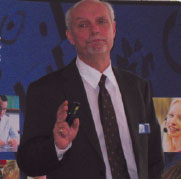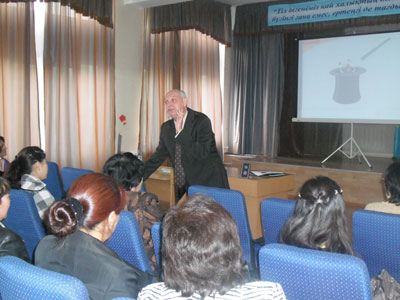About Gary Anderson

Gary Anderson was Pedagogical Director of the language program of the former American Center in Paris, and President-elect of TESOL France when he joined Cambridge ELT as International Teacher Trainer based in Paris.
He has given talks in over 50 countries on five continents, including at TESOL International and IATEFL UK. In this blog, Gary writes about the events he attends and shares some of the ideas and tips that he gives in his talks.
Blog posts
- On the Road with Gary Anderson in…Slovakia
- On the Road with Gary Anderson in…Italy
- On the Road with Gary Anderson in…Lithuania
- On the Road with Gary Anderson in…Romania, Greece and the Czech Republic
- On the Road with Gary Anderson in …Kazakhstan
- On the Road with Gary Anderson in …Switzerland
- On the Road with Gary Anderson in …Serbia
Gary's upcoming travels
- Romania: Cambridge Day, Bucharest; February 27
- Poland: Workshops in Katowice, Krakow, Szczecin, Gdansk; March 10–17
- Bosnia: Workshops in Mostar and Bijeljina; March 25–26
- Croatia: Workshops in Slavonski Brod and Osijek; March 29–30
- UK: IATEFL, Harrogate; April 7–11
- Russia: Workshops in Moscow, Nizhni, Saratov; April 11–15
- Belgium: Cambridge Day, Brussels; April 24
- Netherlands: English for Schools Day, Utrecht; April 28
Sign up for RSS feed
Read Gary's latest blog post as soon as it appears!
Blogs by Cambridge authors
Follow your favourite Cambridge authors here:
- DCBlog, David Crystal
- Bob Dignen's blog on Professional English Online
- That'SLife, Gavin Dudeney
- Andy Hockley's blog
- The Spelling blog, Johanna Stirling
On the Road with Gary in …Kazakhstan
Kazakhstan, a vast and interesting land,
Where four times a day I was asked to stand
To deliver talks and play my pedagogical hand
To teachers of tweens, teens and adults
And give some ideas to help their results.
My first trip to Kazakhstan – the 55th country I've visited on my travels for the Press – where I gave a series of talks in Almaty, the largest city, the capital of Astana (whose name in Kazak I was told means…'capital') and, in between, the regional centre of Karaganda. I found Astana an especially fetching place, sort of a mix of Dubai, with modern buildings springing up all over, and Washington DC, with wide streets, parks, statues and esplanades – but this isn't supposed to be a travel guide but about teaching, so…
I gave twenty talks over five days on nine different subjects including materials informed by the Cambridge International Corpus, teaching the four skills with the Cambridge English 'Real' Skills series, the range of Cambridge ELT IELTS preparation materials, face2face for adults, Business Benchmark for Business English learners, and, for lower- and upper- secondary school students, Messages and MORE! for 'tween-agers' (pre-adolescent 8- to 12- year-olds who are no longer kids but not yet teenagers, so 'between ages') and English in Mind for teenagers (we all know about them!), courses which all include different materials for extensive reading – and at the upper levels of English In Mind even exposure to real classic literature.

With secondary school teachers, we looked at both intensive reading to prepare their students for university and real world professional life and extensive reading for…pleasure. In fact, that's what Stephen Krashen (remember the input hypothesis, the affective filter et al?) calls it: 'pleasure reading'. Most of the teachers agreed (and said they still read to improve their English – as indeed I do in French) with this statement by Phillip Prowse, series editor for Cambridge English Readers, that 'Extensive reading is a brilliant way for learners to improve their English without teaching.' Or as my Aunt Millie said; 'It's nice and nutritious – and so delicious!' 'Delicious' if the learner is reading the genre of story he/she likes; and 'nutritious' because the learner is getting vocabulary in context, constant exposure and recycling of structures, leading to the necessary acquisition of 'automaticity', recognising words and syntax immediately and implicitly.
Now if you don't believe my Aunt Millie, here's how Richard Day and Julian Bamford sum up the research in Extensive Reading in the Second Language Classroom in the Cambridge Language Education series: 'Good things happen to students who read a great deal in the new language…they become better and more confident readers, they write better, their listening and speaking abilities improve, and their vocabularies get richer. In addition, they develop positive attitudes towards studying the new language.' 'Positive attitudes', motivation: what we want in all teaching situations, but perhaps especially seek in secondary school.
What's the best thing to do after reading a book? Well…read another book! But if you want activities for pre-, while- and post-reading activities, there are plenty of ideas in Extensive Reading Activities for teaching Language by Richard Day and Julian Bamford (again) in the Cambridge Handbooks for Language Teachers series. Or just have your students write on small cards why 'I liked/loved this book because…' (as you see now in bookshops across the UK) and post the cards in the classroom to hopefully motivate other students to read another classmate's favourite book (also good for classroom dynamics!)
We'll look at intensive reading in a future blog, but for now: What about you? What's your professional view and/or personal experience on the benefits of extensive 'pleasure' reading?
PS. Congratulations to Phillip Prowse whose Why? has just been announced as the Winner in the Adolescent and AdultóBeginner category of the annual Extensive Reading Foundation awards. And another Cambridge English Readers title won in the Adolescent and AdultóUpper-intermediate and Advanced category: Nelson's Dream by J.M. Newsome.
Gary Anderson, Cambridge ELT International Teacher Trainer


